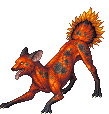Viewing Corona Light

Father: Unknown
Unknown Pedigree
Hardiness: 3
Appearance: 10
Emerged: 13:07 05.04.2022
Matured: 2:41 07.04.2022
Playful and sociable, Suna Hundo are a common sight anywhere prey is plentiful. They travel in small, tight-knit packs led by alpha pairs—usually a male and female, but sometimes two males or two females. Hunts are coordinated by the alphas, who give commands in soft barks and high-pitched whines as they follow their quarry’s scent. There appears to be nonverbal communication through body language as well, though the nuances of this have yet to be investigated. Their coats range in colors and patterns but often feature large or small spots. Wild Suna Hundo living in warmer climates tend to have lighter coats than those living in cooler climates. Although their mane and tail lengths are variable, observed social behavior does not seem to indicate either trait is more desirable. Packs work together to raise juveniles, with females and males alike taking turns to watch the cubs while the others hunt. Suna Hundo are extremely protective of their young and will fight to the death to protect them.
The creatures that dwell in this rather desolate world still display some diversity in appearance, eating habits, and social behavior. Whether they have fur or feathers, skin or scales, their unique genetic makeup allows for a variety of colors and markings within each species. Despite limitations in food sources, herbivores, omnivores, and carnivores are all present in the food chain, and each species requires specialized care within a laboratory. Although the artificial setting of housing units and breeding pods precludes most opportunities to study true interspecific behavior, the interactions within and between species has been studied extensively in the wilderness by scientists daring enough to venture beyond the outpost’s walls.
